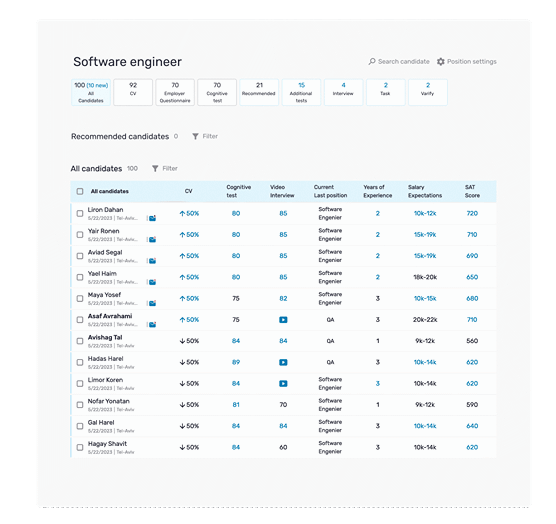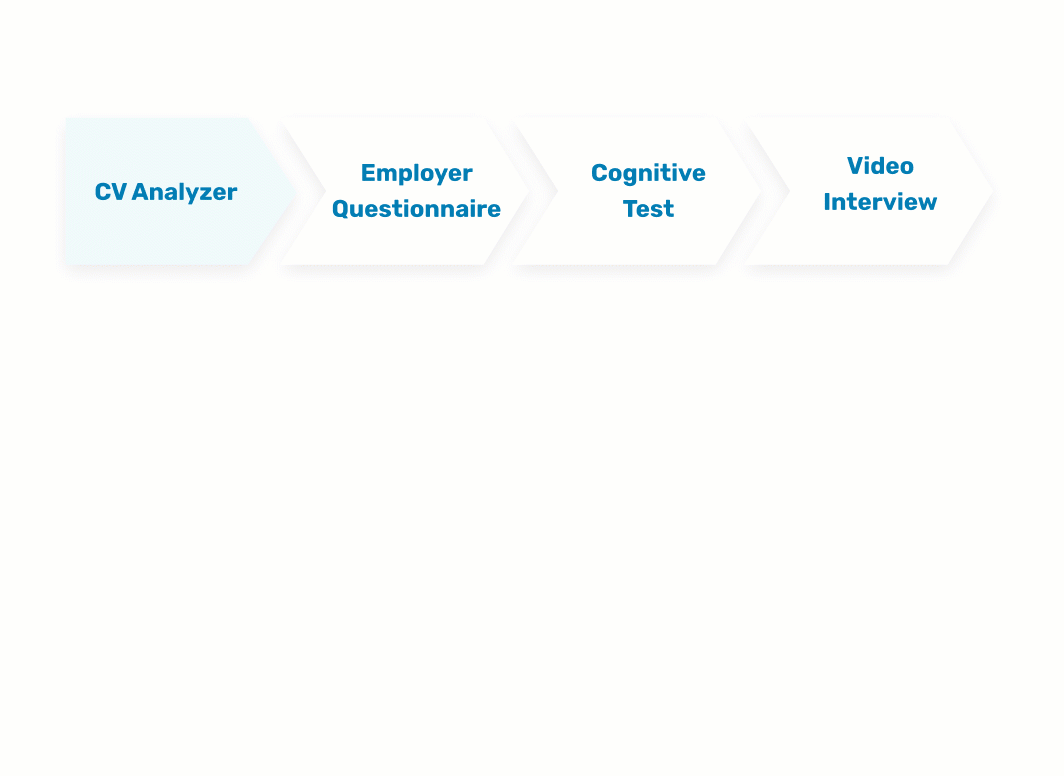In a rapidly evolving employment landscape, businesses are under pressure to fill positions faster, smarter, and with greater precision. Enter AI recruiting – a powerful confluence of artificial intelligence and recruitment strategy, aimed at transforming how organisations identify, attract, and hire talent. No longer a futuristic concept, AI in recruitment is today’s reality, offering both simplicity and sophistication.
This article explores how AI recruiting is shaping modern hiring practices, with a focus on advanced yet user-friendly tools that integrate easily into existing HR systems. From bias mitigation and data security to flexible pricing models and top-tier features like resume screening and predictive analytics, we delve into the pros and cons of these technologies, and highlight some of the top software options worth considering.
Understanding AI Recruiting
At its core, AI recruiting refers to using artificial intelligence to automate and enhance various stages of the recruitment process. Whether it’s parsing CVs, shortlisting candidates, or predicting cultural fit, AI recruitment tools are designed to boost efficiency, reduce human error, and improve hiring outcomes.
The modern AI hiring process is no longer limited to large enterprises. Thanks to user-friendly interfaces and modular solutions, even mid-sized businesses leverage AI recruitment software to streamline their hiring workflows.
Key Features of AI Recruitment Software
Let’s take a look at the most common and useful features offered by today’s AI recruiting platforms:
1. Automated Resume Screening
One of the most time-consuming tasks in recruitment is sifting through hundreds of CVs. Automated AI-powered recruitment solutions can screen resumes at lightning speed, identifying the best matches based on job descriptions, qualifications, and past hiring data.
2. Candidate Matching Algorithms
Advanced AI recruitment tools go beyond keywords. They assess behavioural traits, skills compatibility, and career progression to suggest candidates most likely to thrive in a given role.
3. Predictive Analytics
Recruitment AI systems can forecast hiring outcomes by analysing historical performance data and current market trends. This allows recruiters to make data-driven decisions about potential hires.
4. Chatbots and Candidate Engagement
AI-powered chatbots provide real-time assistance to job seekers, answer FAQs, and keep candidates informed about their application status. This improves the overall candidate experience while reducing administrative workload.
5. Bias Detection and Mitigation
One of the most promising aspects of HR tech AI is its potential to reduce unconscious bias. Many systems are now equipped with algorithms designed to neutralise demographic indicators, ensuring fairer evaluation.
Benefits of AI in Recruitment
1. Speed and Efficiency
AI can complete in minutes what traditionally took recruiters days. By automating mundane tasks, hiring teams can focus on higher-value activities like interviews and strategy development.
2. Consistency and Accuracy
Unlike human recruiters, AI doesn’t suffer from fatigue or subjective judgement. It applies the same criteria to every candidate, ensuring consistent evaluations.
3. Scalability
Whether you’re hiring one employee or a hundred, AI recruiting scales easily to meet your needs without compromising on quality or performance.
4. Improved Candidate Experience
From timely communication to personalised job suggestions, AI in recruitment enhances the journey for candidates, which is vital in today’s competitive talent market.
Potential Drawbacks of Recruitment AI
While AI recruitment software offers significant advantages, it's not without challenges.
1. Over-Reliance on Algorithms
Relying too heavily on algorithms can result in missing out on talented candidates who don’t perfectly fit the model. Human judgement is still essential.
2. Data Privacy and Compliance
Handling sensitive applicant data means AI recruiting systems must adhere to strict data protection laws, including GDPR. Businesses must ensure that their chosen tools are compliant.
3. Initial Setup Complexity
Despite being marketed as easy to integrate, some AI recruitment tools may require technical onboarding or data mapping, which could pose a hurdle for smaller HR teams.
Evaluating AI Recruitment Software: What to Look For
Choosing the right AI recruitment solution requires a thoughtful evaluation of your organisation’s needs. Here are some key factors to consider:
1. Ease of Integration
Look for software that integrates seamlessly with your existing ATS, CRM, and HR management systems. This reduces the learning curve and avoids duplicating workflows.
2. Flexibility and Customisation
The best tools allow you to customise workflows, scoring criteria, and communication settings. This ensures the system can adapt to different roles, industries, and regions.
3. Data Security Standards
Ask vendors about their encryption protocols, data storage practices, and compliance certifications. Robust security is non-negotiable when dealing with applicant information.
4. Transparent AI Models
Opt for platforms that provide explainable AI. This means recruiters can understand how decisions are made, making it easier to justify hiring recommendations to stakeholders.
5. Pricing Models
Many vendors now offer scalable pricing models, from pay-per-user to subscription-based services. Ensure the pricing aligns with your budget and expected usage.
Real-World Use Cases of AI Recruiting
Use Case 1: High-Volume Hiring
A global retailer needed to fill 10,000 seasonal roles within two months. By deploying AI recruitment software, they were able to automate resume screening and interview scheduling, reducing time-to-hire by 60%.
Use Case 2: Diversity Hiring
A tech firm implemented HR tech AI to anonymise candidate data during screening. The result? A 35% increase in diverse hires over one year.
Use Case 3: Candidate Rediscovery
An organisation used AI recruitment tools to re-evaluate past applicants for new roles. This led to a 40% reduction in sourcing costs, as qualified talent already existed within their database.
The Future of AI in Recruitment
Forward-thinking companies will not view AI recruitment as a silver bullet, but as a vital part of a larger talent strategy. The emphasis will be on collaboration between human and machine – where recruiters use AI as an assistant, not a replacement.
AI recruiting is transforming the recruitment landscape –streamlining tasks, boosting efficiency, and opening doors to fairer, more strategic hiring. As AI in recruitment becomes more accessible and affordable, the focus is shifting from experimentation to integration.
Whether you're a multinational or a growing SME, now is the time to explore how AI recruitment tools can elevate your hiring game. With the right approach, grounded in transparency, security, and adaptability, recruitment AI can become a powerful ally in the race for talent.
AI-Recruitment: The AI Recruiting Solution That Actually Delivers
Modern recruitment teams can’t afford to get bogged down by outdated, manual processes. You need hiring technology that’s intelligent, intuitive, and impactful. That’s exactly what AI Recruiting by JobTestPrep provides.
Designed for forward-thinking HR professionals, this AI-powered recruitment solution helps you transform your entire hiring process – boosting speed, accuracy, and candidate experience without adding complexity.
- Reach Top Talent Faster: Leverage AI to instantly identify the most qualified candidates—before your competitors even post the job. Smart insights replace manual screening, ensuring you never miss the right hire.
- Streamline Every Step: From job posting to final offer, manage everything in one place. Sync with your existing HR stack, centralise feedback, and keep your team aligned with a single, user-friendly dashboard.
- Impress Every Candidate: Deliver a modern, transparent hiring experience that puts your brand ahead. Real-time updates and personalised touchpoints keep candidates engaged and informed every step of the way.
- Automate and Optimise: Use AI to scan CVs, rank applicants, assess potential, and reduce bias, so your hiring process becomes faster, fairer, and more data-driven than ever.


FAQs
AI recruitment refers to the use of artificial intelligence to enhance and automate various stages of the hiring process. It works by leveraging algorithms and machine learning to analyse candidate data, screen CVs, match applicants to job descriptions, and even predict future performance or cultural fit. These tools can streamline tasks like resume screening, interview scheduling, and candidate engagement, making the recruitment process faster, more consistent, and data-driven.
AI recruitment tools are designed to reduce human bias, but they don’t eliminate it entirely. Many systems now include features that anonymise candidate data or flag potentially biased decision-making patterns. However, the effectiveness of bias mitigation depends on how the AI is trained and implemented. While recruitment AI can support fairer hiring decisions, human oversight remains essential to ensure ethical and inclusive practices.
The key benefits of AI recruitment software include:
- Speed and efficiency: Automates time-consuming tasks like CV screening and interview scheduling.
- Improved candidate experience: Keeps applicants informed and engaged with real-time updates and chatbots.
- Greater accuracy and consistency: Applies uniform criteria across all applicants.
- Scalability: Easily handles high-volume hiring without compromising quality.
- Bias reduction: Offers tools to help mitigate unconscious bias.
- Data-driven decision-making: Uses analytics and predictive insights to inform hiring strategies.
Many modern AI recruitment tools are built with integration in mind. Look for solutions that support APIs or offer plug-and-play compatibility with popular HR software such as applicant tracking systems (ATS), CRMs, and onboarding platforms. The most effective tools provide centralised dashboards that consolidate recruitment activities, making it easier to manage the process within your existing infrastructure.
The cost of implementing AI recruiting solutions varies widely depending on the vendor, features, and scale of use. Fortunately, many providers now offer flexible pricing models, such as monthly subscriptions or pay-per-user plans, making it accessible to both large enterprises and smaller organisations. While there may be upfront costs for integration or training, the long-term savings in time, efficiency, and quality of hire often justify the investment.
No, AI recruitment is not intended to replace human recruiters but to augment their capabilities. AI can handle repetitive and data-heavy tasks, freeing up human professionals to focus on strategic elements like relationship-building, interviewing, and culture assessment. The most successful hiring strategies use AI as a collaborative tool, not a replacement for human judgement.
To ensure data privacy and compliance, especially with regulations like GDPR, it's essential to choose AI recruitment software that adheres to strict security standards. Look for vendors who offer:
- End-to-end encryption
- Transparent data handling policies
- Regular audits and compliance certifications
- Clear protocols for candidate consent and data storage.
Additionally, ensure your internal HR policies align with the use of AI tools, and that all staff are trained in ethical data use.



